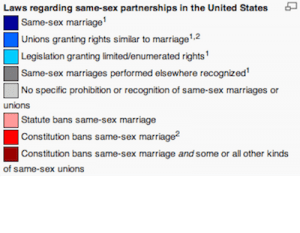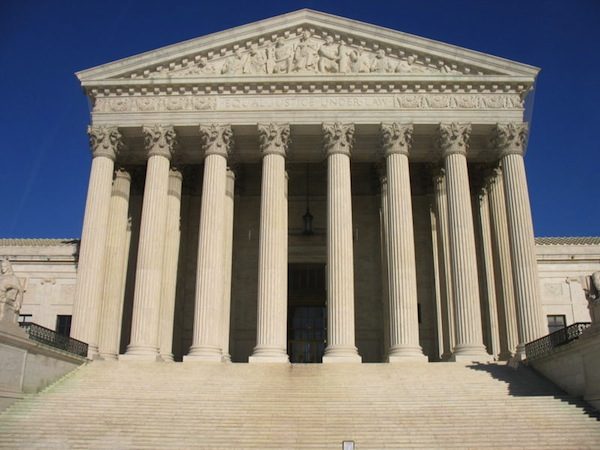The U.S. appeals court in Boston ruled the DOMA unconstitutional. But the fight isn’t over yet. Get all the facts and find out how you can help!
Thursday, May 31, 2012 was a very important day for marriage equality crusaders. For the first time, the U.S. Court of Appeals for the First Circuit, in Boston, ruled the Defense of Marriage Act, passed by congress in 1996, unconstitutional. The unanimous ruling states the act unfairly denies married gay and lesbians equal benefits.
This ruling against DOMA, which argues that marriage is between a man and a woman, was a crucial second step after President Obama’s recent announcement in support of same-sex marriage, since, according to the Los Angeles Times, next year, the Supreme Court will rule on the “constitutionality of the law that limits federal recognition of marriage to the union of a man and woman.”
While news of this political act certainly adds muscle for marriage equality, it does not mean that same-sex marriage is yet recognized as a whole, but that the federal benefits should be equal—and no immediate effects will take place as of yet. The Boston ruling asserts that in states where same-sex marriage is legal, such as Massachusetts, Vermont and Washington, couples should not be denied the same federal benefits that apply to heterosexuals, such as the ability to file joint tax returns.
George W. Bush appointee and one of the three-judge-panel in Boston, Michael Boudin, explained, “Only the Supreme Court can finally decide this unique case.”
Then, late Thursday night, the White House released a video of First Lady Michelle Obama announcing her support of same-sex marriage, stating: “For Barack and me, it really comes down to the values of fairness and equality that we want to pass down to our girls… And in a country where we teach our children that everyone is equal under the law, discriminating against same-sex couples just isn’t right. So it’s as simple as that. …We’re proud to have your support.”

First Lady Michelle Obama (Photo Credit: Joyce N. Boghosian)
But the fight to overturn DOMA isn’t over just yet. As a community, it’s important we have all the facts and resources, so that we can bring ongoing visibility to the harm DOMA has and will continue to create for gay and lesbians. Read on for everything you need to know about the Defense of Marriage act and to learn how you can join the fight for marriage equality!
10 Things You Need to Know About DOMA:
1. Wait, what is DOMA?
The Defend the Marriage Act says simply: marriage is between a man and a woman. (Specifically, that’s called Section 3: Definition of Marriage) It prevents the federal government from recognizing any marriage between gay and lesbian couples, even if they are recognized by the state they were married in (That’s Section 2: Powers Reserved to the States) It’s what the U.S. Appeals Court just declared as unconstitutional, and thank heavens for that.
2. It’s about how states define marriage.
The very definition of “marriage” is arguable from state to state. While DOMA does not forbid any state from recognizing gay and lesbian marriages, in the states where “marriage” is between a man and woman—29 states to be exact—DOMA is enacted.
3. But, six states and the District of Columbia do recognize same-sex marriage.
That’s Massachusetts, Vermont, Connecticut, New York, Iowa, and as of February and March, Washington and Maryland were added to the list, though their laws are not in effect quite yet.


4. Who is fighting to overturn DOMA?
While the fight to overturn DOMA has always been in the cards, there’s been an increase in attention over the last few years. In 2010, U.S. District Judge Joseph Tauro of Massachusetts found DOMA unconstitutional in two separate cases. In August of 2011, Attorney General Eric Holder was the man of the hour, who announced the Obama administration would no longer defend the law. And then this past year, the same went for U.S. District Judge Jeffrey White in California. The most recent judge to join the pack in ultimately overturning DOMA is Claudia Wilken, a district court judge form northern California who signed the decision in a class-action lawsuit known as Dragovich v. Department of the Treasury. And as of May 31, the U.S. Court of Appeals in Boston declared in a three-judge panel, led by Judge Michael Boudin, originally appointed by the Bush administration, that DOMA is in fact unconstitutional.
5. So, how many times has the federal court found DOMA unconstitutional?
Claudia Wilken champions the fourth time a federal court has recognized DOMA as unconstitutional. In the aftermath of the latest ruling in the U.S. Appeals Court in Boston, the activity and attention seen in effort to overturn DOMA is unprecedented.
6. But the fight isn’t over when anyone can step in and defend DOMA, at a price.
The House Bipartisan Legal Advisory Group has been at the forefront in defending DOMA, assembled at the hands of House Speaker John Boehner. House Republicans have been trying to defend DOMA ever since the Obama administration announced they would stop defending DOMA last August. Boehner stands alongside House Majority Leader Eric Cantor and House Majority Whip Kevin McCarthy in his aggressive no-budge position. In fact, any anti-gay group could step in to defend DOMA if they had the “standing” to do so. But according to the Huffington Post, even if a private law firm made attempts to defend DOMA in court, it could cost as much as $1.5 million in taxpayers money.

President Barack Obama (Photo Credit: Tim Bekaert)
7. Fight for your right!
Without DOMA around, the government has to acknowledge your marriage as equal to that of a heterosexual marriage, allowing you and your partner benefits that are commonplace in heterosexual homes—there are over 1,000 benefits gay and lesbian couples could potentially receive.
8. Even without DOMA, it’s still a states issue.
So, say DOMA is in fact totally eliminated. If you get married in Massachusetts, and you’re now privilege to federal benefits, moving to a state that does not recognize your marriage will put you back at square one—since, that state does not have to legally recognize your Massachusetts marriage. This means gay and lesbians are left with a “stay put” mentality, which may interfere with job relocations, educational opportunities and so on.
9.Take it to the Supreme Court!
The final say in all of this resides at the crème de la crème of the court system: the Supreme Court. If and when they decide to overrule DOMA, it’s a great chance for other laws to come into play, perhaps in protection of gay and lesbian marriage.

The US Supreme Court (Photo Credit: Kjetil Ree)
10. What can we do now?
You too can take action. Do your part by joining the DOMA Project. It’s a great way to stay informed on all the resources necessary to ensure we win this fight against DOMA for good. When the elections approach, make sure you know where your choice candidates stand. Many LGBT organizations have petitions and addresses where you can write to your senators, asking them to end the discrimination of DOMA. The Human Rights Campaign is one of those organizations. You can sign their petition to congress or Join Freedom to Marry and speak out to legislators. There are countless ways to show your support, donate and stay informed.
